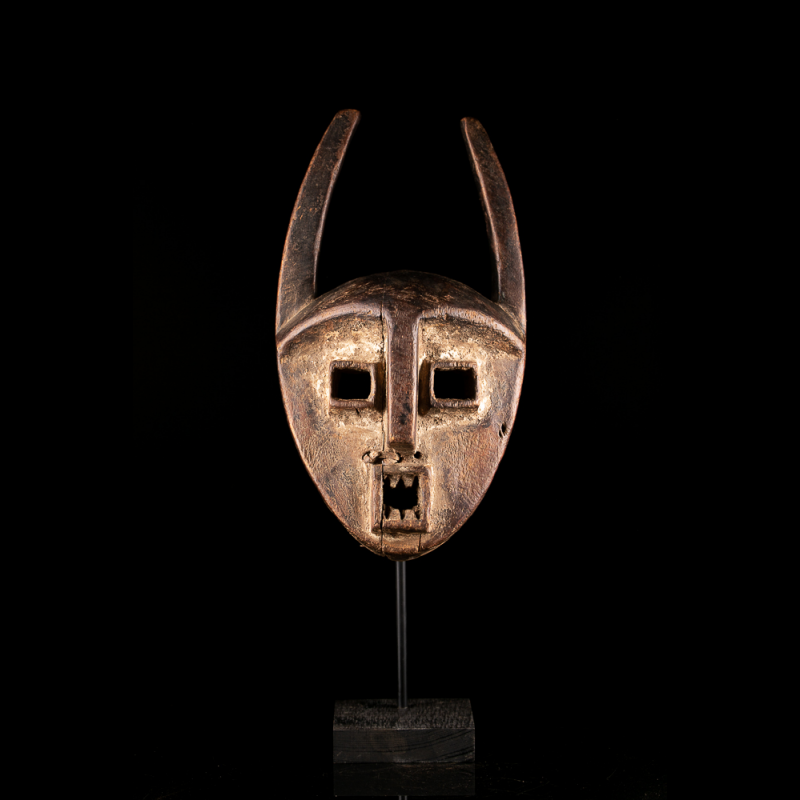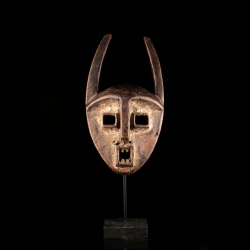










The Binja masks, originating from the Congo region, are significant works of art and objects in the culture of the Bembe, an ethnic group primarily residing in the southeast of the Democratic Republic of Congo. These masks play an essential role in the ceremonies and traditional rituals of the Bembe.
Here are some important characteristics of the Binja masks from Congo:
Cultural Significance: Binja masks hold deep cultural and spiritual significance for the Bembe. They are often used in ceremonies related to agricultural cycles, rites of passage, weddings, and other significant community events. These masks embody ancestral spirits and play a role in communication with the spirit world.
Materials: Binja masks are typically crafted from natural materials such as wood, plant fibers, natural pigments, and other local elements. Each mask is hand-carved with great attention to detail.
Stylistic Features: Binja masks are characterized by their distinctive stylistic traits. They often depict stylized human or animal faces with elements like cubic eyes, square or rectangular shapes, prominent and pronounced nasal ridges, and protruding nostrils. The colors used may vary, but they are generally vivid, often employing kaolin, and hold symbolic meaning.
Ritual Function: During ceremonies, the bearers of Binja masks dance and perform specific movements that are considered a connection to ancestors and spirits. These dances and performances are often accompanied by chants and percussion rhythms.
Cultural Heritage: Binja masks are a precious cultural heritage for the Bembe, and their production and use are passed down from generation to generation. They symbolize the cultural identity and spiritual continuity of the community.
In summary, Binja masks from Congo are ritual art objects with significant cultural and spiritual importance for the Bembe. They embody the relationship between the world of the living and the world of spirits, and their ongoing use plays a central role in the traditions and beliefs of this ethnic group.
Data sheet

The Binja masks, originating from the Congo region, are significant works of art and objects in the culture of the Bembe, an ethnic group primarily residing in the southeast of the Democratic Republic of Congo. These masks play an essential role in the ceremonies and traditional rituals of the Bembe.
Here are some important characteristics of the Binja masks from Congo:
Cultural Significance: Binja masks hold deep cultural and spiritual significance for the Bembe. They are often used in ceremonies related to agricultural cycles, rites of passage, weddings, and other significant community events. These masks embody ancestral spirits and play a role in communication with the spirit world.
Materials: Binja masks are typically crafted from natural materials such as wood, plant fibers, natural pigments, and other local elements. Each mask is hand-carved with great attention to detail.
Stylistic Features: Binja masks are characterized by their distinctive stylistic traits. They often depict stylized human or animal faces with elements like cubic eyes, square or rectangular shapes, prominent and pronounced nasal ridges, and protruding nostrils. The colors used may vary, but they are generally vivid, often employing kaolin, and hold symbolic meaning.
Ritual Function: During ceremonies, the bearers of Binja masks dance and perform specific movements that are considered a connection to ancestors and spirits. These dances and performances are often accompanied by chants and percussion rhythms.
Cultural Heritage: Binja masks are a precious cultural heritage for the Bembe, and their production and use are passed down from generation to generation. They symbolize the cultural identity and spiritual continuity of the community.
In summary, Binja masks from Congo are ritual art objects with significant cultural and spiritual importance for the Bembe. They embody the relationship between the world of the living and the world of spirits, and their ongoing use plays a central role in the traditions and beliefs of this ethnic group.